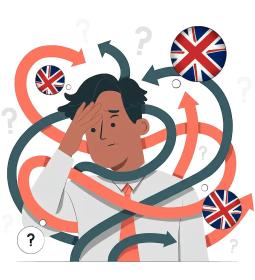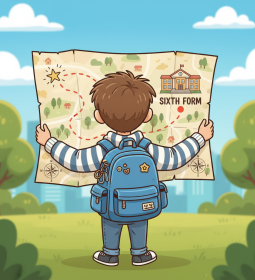Have you ever wondered how quickly things are changing? Until recently, it seemed that a school with a blackboard, chalk and the same textbooks for everyone was forever, but today we are literally drawn into the future, where everything is not so obvious. Artificial intelligence, virtual worlds, hybrid learning models all sound impressive, but also a little scary at the same time, let's face it. Here is the main question that we are afraid to ask: will teachers remain, or will they be replaced by technology?
Let's figure out what exactly is happening in education right now, what awaits us in 2025 and why all this causes both delight and slight confusion.

Figures that make you think
Education is one of the largest industries in the world, its share in global GDP already exceeds 6%, and it seems that this is just the beginning: the market is expected to grow to $7.3 trillion by 2025. If you look a little further, by 2030, this amount is closer to 10 trillion.
But do you know what really amazes? By 2040, about 90% of all professions will require at least basic digital skills! The most surprising thing is that almost two-thirds of the children who study in schools today will work in areas that simply do not exist yet.
This is where the most interesting begins. If the world is changing so much, then the old approaches to learning will definitely not cope, we need something new. This new thing is already coming, although, to be honest, sometimes it looks like shots from a science fiction movie.

Personalization: Everyone has their own path
Remember your school years: everyone has the same textbooks, the same assignments, the same schedule... If the material is difficult, well, try to figure it out yourself or hire a tutor.
But imagine a different scenario: the learning process adapts to you. Everything is individual, the teacher is no longer torn between dozens of students, and the algorithms select tasks just for you. This is how personalized learning works, which is becoming more and more real thanks to artificial intelligence. For example, AI tracks your progress: what topics you have already understood, where the gaps remain, what arouses interest. If it's more convenient for you to study the material through videos, here are the videos, and if you perceive the text better, you will get detailed instructions.
Sounds great, doesn't it? But the question is: how will this affect teachers? It turns out that AI takes over some of their work. Although they say that the machine is just an assistant, not a replacement, there is still a feeling that something important is being lost.

Immersive Learning: Learning as an Adventure
Now let's remember what we dreamed of at school. Did you want to travel to ancient Egypt or see how the human heart works from the inside? It sounds unrealistic, but technology is making it a reality! Virtual reality (VR) and augmented reality (AR) make learning lively and exciting, when instead of dry texts, there is immersion in the topic.
What it looks like:
- In a history lesson, you don't just read about the Roman Empire, but walk through the virtual streets of ancient Rome.
- In biology, you can shrink down to the size of a molecule and see how cells divide or how blood circulates through vessels.
- What about medical universities? Students are already conducting virtual surgeries there. Imagine, you are a surgeon, but the patient is not real, but simulated! A mistake is not fatal, but the experience is invaluable.
With such technologies, learning becomes not just a process, but a real adventure. But here the question arises: if we immerse ourselves in the virtual world like this, will we lose touch with the real one?
Hybrid Education: Freedom of Choice
Everything is going to the fact that studying will no longer be tied to one place. Do you want to sit at a desk? You are welcome. Want to study from home? This is also possible. Hybrid education combines both.
Example:
- The student goes to school for basic lessons, and the rest of the topics are studied at home through the platform.
- A student from another country joins a lecture by a professor who is thousands of kilometers away.

This model gives you incredible flexibility; It is especially useful for those who live in remote regions or for students who combine study with work.
But here another question arises: what about motivation? After all, it is so easy to get distracted in an online format.
What about security?
This is where the most disturbing thing begins. The more technology, the more data, and it needs to be protected.
In February 2023, there was a high-profile incident: hackers broke into the systems of Minneapolis public schools and stole students' personal data, including medical records.
The more we move into the digital environment, the greater the risk that our data will end up in the hands of attackers. Therefore, cybersecurity is one of the main topics for educational platforms.

Ecosystems: Everything under one roof
Education is becoming more and more integrated. Educational institutions, online courses, corporate preparation — everything comes together in ecosystems.
Such ecosystems help make education accessible, but the question remains: will they become monopolists dictating their own rules?
Microlearning: Short but Effective
If you think that learning is thousands of hours of lectures, forget about it, today everything is changing towards micro and nano learning. How it works:
- Lessons last 10-15 minutes,
- Tasks are broken down into short stages so that they can be mastered in a few minutes.
For example, there are already platforms that teach foreign languages "piece by piece" – lessons last 5-10 minutes and are very easy to learn. It seems to be perfect for our rhythm of life!
What awaits us tomorrow?
Technology is changing education faster than we have time to get used to it. AI, virtual reality, ecosystems – it all sounds exciting, but at the same time, there is a feeling that we are losing something. Teachers are no longer just teachers, but rather coordinators. Students are immersed in virtuality, forgetting about reality, and data becomes too vulnerable.
So what awaits us in 2025? Probably something amazing and frightening at the same time. One thing is for sure: it will not be boring!









